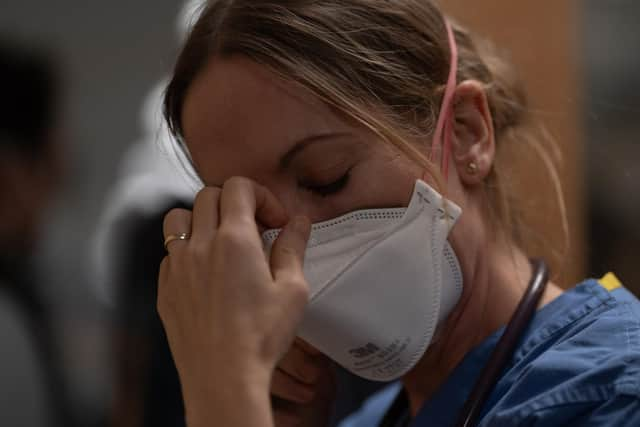Breathtaking shows the impact of the pandemic can’t be swept under the carpet - Daxa Patel
As a former clinical negligence solicitor, I have an insight on the subject matter. Like with the TV series, Mr. Bates and the Post Office, the ITV producers did a great job. They gave voice to those health and medical practitioners who still feel the impact of what they went through during the pandemic.
Dr. Rachel Clarke, a Palliative Care Consultant wrote her memoir, and this was turned into this TV documentary/ drama. As she said in her interview on Sky TV: “If we don’t talk about it, how can we process it.”
Advertisement
Hide AdAdvertisement
Hide AdI have written in the past about the impact I have sensed and observed, and the somewhat needless suffering, not to mention needless death caused by the mismanagement of the pandemic. I am certain the Covid inquiry will conclude with strong observations about the decision-making, to what extent of course this remains to be seen.


I am glad that ITV are highlighting yet another national scandal, but it is sad that it takes a TV company to do the job of those governing us, the act of listening. Politicians will be busy thinking about the forthcoming general election but one thing we cannot escape with regards to both these scandals involving the Post office and our health service, is that the state had power to do things differently.
People who could not be saved due to medical care being rationed and the impact on innocent victims requires an enormous amount of healing, and one way to do that is by talking about it openly, hopefully, with some constructive lessons to implement along the way.
There must be thousands of medical and health care staff, in the NHS, care sector, and General Practice, deeply traumatised just like the many who are grieving the loss of a loved one, in some cases, more than one family member, whom they could not see at the end, or those suffering from Long Covid.
Advertisement
Hide AdAdvertisement
Hide AdLack of proper masks and lack of psychological support means not only do we have an NHS that is broken, we know that because the fault lines were made bare during the pandemic, we also have a mountain of suffering that we are now ignoring. I say we, I mean the government.
The Department of Health and Social Care, NHS England and the Government may not come out in a positive light. Whenever someone says sorry, you have to ask how genuine the apology is. It is easy for the Government and the other agencies involved, to defend themselves saying they did their best, and that they are committed to learning but even allowing for the fact that Covid was unexpected, you cannot help feel that as a nation we could have done much better had we listened.
We could have done much better to support the staff in the health and medical sector, and we could have done much better to support the families, and patients who suffered, and are still suffering.
Coming back to the mountain of suffering and the process of healing, some will no doubt need formal medical help from qualified practitioners but most, may appreciate a safe space where they can be heard or just seen.
Advertisement
Hide AdAdvertisement
Hide AdMy business as a leadership coach has made me acutely aware of the power of active listening. We must start on the premise that we are surrounded by people who have been scared, scared because their colleagues, or loved ones died alone. Scared because as a nation we sent patients back into care homes because the policy was that there was no need for a negative Covid test. Shocking as it may sound, this was part of the national guidelines.
Many frontline workers died due to Covid and many have left their service. Yet Covid did not discriminate; it affected us all. What can we do to aid the healing process? Politicians fighting to stay on as Members of Parliament must prove their credentials on this issue.
Standing on the periphery, these are my suggestions, and I would love to hear from managers in the NHS or those in charge of care home staff, who might have better ideas.
We need healing hubs where people can meet and talk with a trained facilitator. Perhaps places like Starbucks can lead the way on this.
Advertisement
Hide AdAdvertisement
Hide AdIncentivise those who wish to become trained counsellors. Fast track them into paid roles so that people are not left on waiting lists for long periods of time. Attract retired, driven, caring individuals to give their time and expertise to help those broken. Safeguarding will be needed but we need to treat this as a national emergency.
Yes, we have adapted to life after the pandemic and some of us have forgotten how horrible this period was worldwide but what we cannot refute is most of us will have lost someone during the pandemic.
I lost two cousins and a sibling who were otherwise fit and healthy. Millions of others experienced similar losses so let us not brush this under the carpet and pretend we are over the effects of the pandemic.
Daxa Manhar Patel is a leadership coach, author and solicitor.
Comment Guidelines
National World encourages reader discussion on our stories. User feedback, insights and back-and-forth exchanges add a rich layer of context to reporting. Please review our Community Guidelines before commenting.